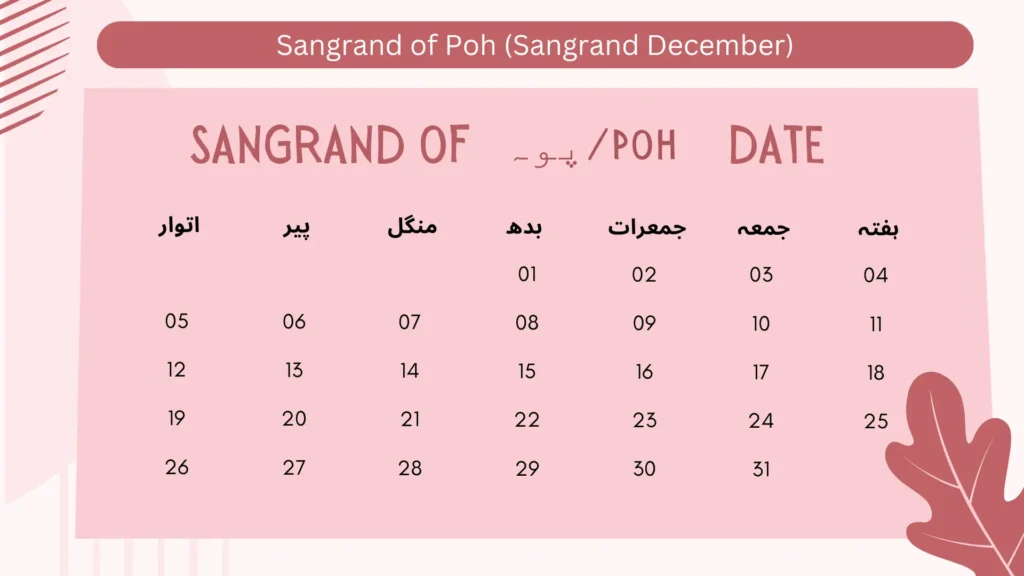Sangrand of Poh in December According to the Nanakshahi Samvat Calendar
On December 14, Sikhs celebrate the 10th Sangrand of Poh. Poh is the 10th month in the Nanakshahi Sikh Calendar, according to the Gurbani of Baramah. Baramah is the bani that was first blessed to us by Siri Guru Nanak Dev Saheb Ji in Tukhari Raag and then by Siri Guru Arjan Dev Saheb Ji in Majh Raag.
You can view the list of all Sangrand dates for each month in the current year. You can also see the English calendar dates for Sangrand in January, February, March, April, May, June, July, August, September, October, and November for the current year.

Poh Tukhar Navayap Pai
Poh Tukhar Navayap Pai Kant Milia Harnahu (ਪੋਹ ਤੁਖਰ ਨਵੈਪ ਪਈ ਕੰਤ ਮਿਲਿਆ ਹਰਿ ਨਾਹੂ: In the month of Poh, with the freezing cold, one meets the Beloved Lord).
Sangrand of Poh, or, as Baramah describes, Poh. Poh is the 10th month of the year, starting in mid-December and lasting through mid-January, aligning with the Gregorian calendar. So, from mid-December to mid-January, Sangrand of Poh is in the month of December. Guru Arjan Dev Saheb Ji blesses us with Poh Tukhar Navayap Pai.
The Significance of Tukhar during the Sangrand of Poh
During the Sangrand of Poh or in this month of Poh, Tukhar (ਤੁਖਰ: cold, frost) literally means frost or ice. When someone is freezing, just like ice becomes frozen and hard, Tukhar means to be frozen or in extreme cold. Poh Tukhar Navayap Pai implies not feeling frozen or extremely cold in this month of Poh when Kant Milia Harnahu.
The Embrace of the Husband Lord
Kant (ਕੰਤ: beloved, husband) means the neck or, as we say in Punjabi, galvakri(ਗਲਵਕੜੀ: embrace), in a hug, a loving hug. Kant Milia Harnahu signifies that our Pati Parmeshar (ਪਤੀ ਪਰਮੇਸ਼ਰ: husband Lord), our husband Lord, as we are the soul brides of Akal Purakh Waheguru (ਅਕਾਲ ਪੁਰਖ ਵਾਹਿਗੁਰੂ: the Timeless Being, the Wonderful Teacher), is taking us in his grasp in a loving hug. Therefore, we don’t feel frozen or cold in this month of Poh or during the Sangrand of poh because our husband, the Lord, has taken us in their blessed hug.
The Metaphor of Old Age and Loneliness during the Sangrand of Poh
Poh can also translate to being old. In the cold weather and winter months, one can feel very cold. Poh Dhamina (ਪੋਹ ਦਮਹਿਨਾ: the month of Poh) is in the winter months. There are places on Earth where it is summertime, but specifically, Poh describes the winter months.
The Warmth of Divine Love during the Sangrand of Poh
During the Sangrand of Poh which is in the winter month, we don’t feel frozen because we’ve been hugged by our husband, Lord. As I said, Poh also translates to being old, and in old age, we sometimes feel lonely, and in our house, we feel cold due to our loneliness. We don’t have that warmth of love, and because we’re old, we may feel lonely.
Guru Sahib Ji says that in this month of Poh, during the winter months, we are not frozen, and we don’t feel cold, whether we are young or, specifically, if we’re old. As we grow old, we think that cold much more, but in this Shabad, Guru Sahib Ji’s blessing is that we don’t feel that cold because Akal Purakh Waheguru, our husband Lord, has taken us in their grasp: Kant Milia Harnahu.
Eternal Bliss and the Gurmukh
Further, in Sikhi, when we become one with the Lord, we are in eternal happiness and bliss. Gurbani teaches us this: Gurmukh Bude Kade Nahi Jina Antar Sarbat Gyaan (ਗੁਰਮੁਖ ਬੂਡੇ ਕਦੇ ਨਹੀਂ ਜਿਨਾ ਅੰਤਰ ਸਰਬਤ ਗਿਆਨ: A Gurmukh never grows old, as they have divine knowledge within). A Gurmukh is never old; they never become old because they know Waheguru within their consciousness. They are forever young and living, becoming infinite because they are one with the infinite Almighty Waheguru.
The Blessings of Naam during the Sangrand of Poh
In this month of Poh or during the Sangrand of Poh, those taken by their husband, the Lord, in that blessed hug are named Harnahu. They are blessed with Naam and become one with the Lord, so they don’t feel the pain of being cold or frozen because Akal Purakh Waheguru has blessed them.
Liberation from the Cycle of Birth and Death
Further, if we translate being old, we have become old and weary, traveling through the 8.4 million birth and death life cycle, reaching the highest form: this human form. In some ways, we’ve become old and weary, but we won’t feel Tukhar in this life. We won’t feel the cold of all the paap (ਪਾਪ: sins) or negative actions we have committed, which keep us in the cycle of birth and death. We won’t face them anymore because our husband, the Lord, has taken them away. We won’t feel the effects of those negative karma (ਕਰਮ: actions) that we might have done while going through those lives.
Yes, we’ve done some positive karma being given this human form, but we will have done negative ones, too; that’s why we’re still in the birth and death life cycle. But we won’t have to face them because our husband, the Lord, has taken us in their grasp, lovingly hugging us. Therefore, we are blessed, and all our pains, sufferings, and paap are taken away in this month of Poh because we are in the sanctuary of our husband, Lord, and have been blessed with that name.
Conclusion: Embracing the Teachings
In this month of Poh or during the Sangrand of Poh, this winter month, we don’t feel frozen or cold. In old age, we don’t feel frozen or cold. And in this old and weary age of the 8.4 million birth and death life cycle, we don’t feel cold, frozen, or the effects of the negative paap we’ve done. Why? Because we’ve been grasped in that loving hug by Akal Purakh Waheguru, who has given us their name. Kant (ਕੰਤ: neck, beloved) is where we’ve recited that name; therefore, we become one with the Lord and are blessed.
In this month of Poh or during the Sangrand of Poh, we’ve been taught to recite and repeat the name of the Lord over and over, and then we are taken in that loving hug. We don’t feel that pain, tension, or anguish of being frozen or cold, whether we are physically old or whether, in this human life, we have become weary and old, traveling through the birth and death life cycle.
We’ve been blessed in this month of Poh. These are the teachings. Let us hope and pray that we can live, listen, believe, and follow the teachings of Guru Saheb Ji so that we can break free from the 8.4 million birth and death life cycle and be part of that loving grasp, that loving hug, and can repeat the name of the Lord.
